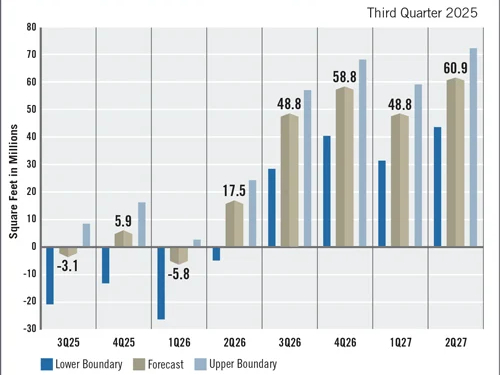Can the Russia-Ukraine Crisis Make CRE More Sustainable?
Owners will look to reduce energy costs in the wake of spiking oil prices.
With energy prices skyrocketing since Russia invaded Ukraine, there’s a lot of talk about how to reduce U.S. dependence on expensive foreign oil and how to reduce our dependence on oil and gas, period. Does that mean the Ukraine crisis will accelerate energy efficiency and the transition to renewable energy? If the pattern of history repeats itself, it will.
On March 8, President Biden banned Russian oil imports. That, along with other sanctions, was designed to stymie Russia’s economy and make it more difficult for Vladimir Putin to wage war. But these measures have been a difficult sacrifice for U.S. businesses and consumers, who were already feeling the post-pandemic inflationary pinch at the pump and on their energy bills.
LISTEN TO THE PODCAST: What the New Energy Crisis Could Mean for CRE

Economist Hugh Kelly
“You had both demand (pull) and cost (push) pressures on prices, and now you’ve got the exacerbation of that from Ukraine,” said economist and Commercial Property Executive columnist Hugh Kelly. “It’s an extraordinary moment.”
The price of oil was $75 per barrel at the beginning of the year and about $100 a barrel in February before the conflict’s outbreak. In anticipation of Biden’s ban announcement, oil reached $130 per barrel, a 13-year high, on March 6. This week the price dropped back down below $100 a barrel as Russia and Ukraine enter talks and China’s COVID-19 lockdowns threaten demand.
For now, the U.S. will fill the void in Russian oil with more oil. Domestic production of oil and natural gas will likely increase, and the U.S. will probably import more oil from its other foreign sources, which include Canada, Mexico and Saudi Arabia.
But you can also expect a greater focus on energy conservation, alternative sources, and energy technology as the government and industry seek solutions to the sticker shock and geopolitical tensions. That activity will help drive down the price of innovation and renewables.
According to Elizabeth Beardsley, senior policy counsel at the U.S. Green Building Council, the increased urgency for energy efficiency and sustainability is likely because sky-high energy prices are both a “kitchen-table” and a boardroom issue; the price hikes highlight that energy, particularly fossil fuels, is a finite resource; and oil independence is a national security issue. Besides, the U.S. has been down this road before.

Elizabeth Beardsley, Senior Policy Counsel, U.S. Green Building Council
“If we look at the 1970s energy crisis, that was really impactful in starting to drive better attention and investment on efficiency and made efficiency be taken seriously as a resource,” Beardsley said. “The cheapest unit of energy is the one you don’t need and that’s still the case. We got a good start on efficiency in the last 50 years, but there’s still a ways to go.”
That energy efficiency has increased U.S. energy productivity—the ratio of GDP to total primary (natural) energy usage. The Russia-Ukraine crisis and its fallout will be another driver to continue that trend, Beardsley said. And, yes, that’s good for the planet, also.
“We’re a little ecumenical as far as motivation,” she said, “as long as the steps are in the right direction, and it’s the progress that we want to see.”
The Price Is Right
Energy productivity is also a microeconomic issue, so the commercial real estate sector is likely to partake in the push for efficiency and renewable energy investments. Again, not so much because it is better for the environment, but because when the price of hydrocarbon-based fuels like oil, gas and coal is surging, energy efficiency and renewable energy investments seem like economical alternatives.
John Chang, senior vice president & national director of research and advisory services at Marcus & Millichap, noted that ESG and impact investing is already on the rise, particularly by European investors, but for some investors it has been more of a “mathematical” question. With current forces converging, though, energy-minded investments are likely to pencil out for a wider segment of the industry.
“I think that everybody says ‘Yeah, that’s good, we should be doing that,'” said Chang. “However, what they don’t want to do is pay extra for it, right? There’s a resistance to it.”

John Chang, National Director of Research and Advisory Services at Marcus & Millichap
Chang called increased energy awareness a “silver lining” of the Russia-Ukraine crisis for commercial real estate. Rising energy prices also present major challenges for the office and industrial real estate markets.
Increased inflation and a higher cost of capital—the Federal Reserve is expected to begin increasing interest rates this week—will negatively impact both property types. Meanwhile, office workers who were reluctant to return to the office will be even more resistant due to the increased cost of driving to work. Industrial property owners could see a decreased demand from logistics tenants and a reconfiguration of distribution networks.
Infrastructure Constraints
Regardless of how high geopolitical tensions drive the price of energy, however, the commercial real estate industry’s relationship with fossil fuels is a complicated one and will not be ending soon.
“A vast amount of the electricity that is produced in the U.S. derives from things like natural gas, and so it’s going to be really hard to have a building powered strictly on alternatives,” said Preston Young, national head of office investor services and partner for Dallas-based Stream Realty Partners.
Natural gas is a domestically harvested fossil fuel. It is cleaner and less expensive than oil and coal, and it has been suggested as a logical replacement for the 8 percent of U.S. oil supply that we get from Russia. According to the National Resource Defense Council, however, it is also “a major contributor to air pollution, water pollution and climate change.”
When it comes to sustainable investments, Young counts himself among the cost-conscious. The company uses solar panels, mostly on industrial properties whose large roofs provide good surfaces for the equipment.
“We’re entering this energy transition, knowing that there has to be a reasonable time period that takes place, and there has to be a reasonable amount of cost that people are willing to absorb because, if it starts to go up too much, then people will start to lose their patience pretty quickly,” he said.
In the meantime, Young agrees that energy efficiency and energy management will be paramount for property owners as they attempt to ride out the price spikes.

Preston Young, National Head, Office Investor Services, Stream Realty Partners
Stream will rely on the energy management systems it has deployed over the past 10 years like state-of the-art HVAC systems and devices that dim lights after business hours. “We are certainly being more conscious on the energy consumption side,” Young said.
On the supply side, Stream and other owners have become much more strategic about energy procurement and other expenses so they are less subject to market volatility.
“Sometimes it’s local legislation and how that might impact property taxes or property tax valuations,” he said. “It could be your electricity consumption. It could be a myriad of things. Having that type of foresight, particularly in markets of uncertainty, is very crucial.”
How Long a Trend?
While Young is feeling pretty confident about managing expenses on current holdings and development projects, higher energy prices will cause the firm to be hesitant about new ventures.
“The spike in energy has created a vast amount of uncertainty, not just in the real estate financial markets, but all financial markets,” he said.
Uncertainty is certainly bad for commercial real estate and the rest of the economy, but it promises to have clear benefits for energy efficiency and sustainability. The degree to which the Russia-Ukraine conflict helps—and hurts—commercial real estate is connected not to the duration of the war, Chang said, but to the duration of the sanctions on Russian oil.
“If Russia says ‘O.K., we’re done. You can lift the sanctions now.’ Is that what happens? Or do the sanctions extend through a post-war sequence that is tied to war crimes or compensation for the damages in that country?”







You must be logged in to post a comment.